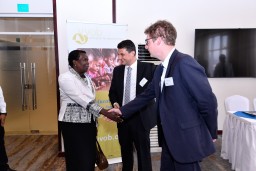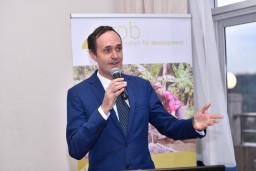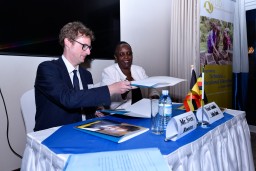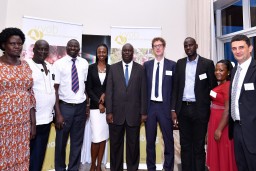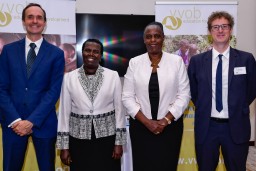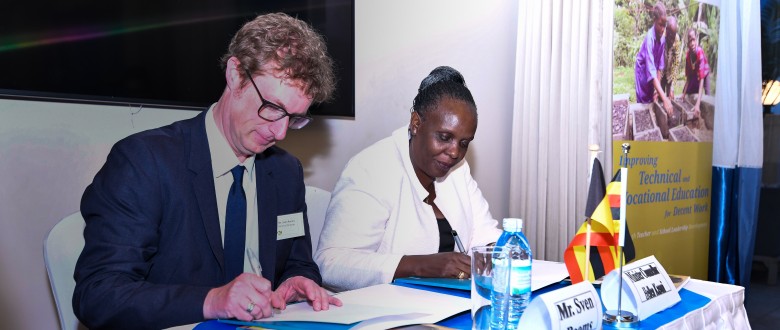
On 14 May 2019, Uganda and VVOB signed a partnership agreement. At a high-level event held in Uganda’s capital city of Kampala, Minister Counsellor Hellen Kasozi from Uganda’s Ministry of Foreign Affairs and VVOB General Director Sven Rooms made a commitment to work together towards quality education for all learners in Uganda. A first big undertaking within the partnership framework is ‘From classroom to land: teaching agriculture practically’, a programme aimed at providing Uganda’s youth with the skills necessary to succeed in the agricultural sector.
Economic backbone
Uganda is home to a youthful population of 9.9 million adolescents striving for economic opportunities. Many of them see a future for themselves in the agricultural sector, not simply as farmers producing for household consumption, but as ‘agripreneurs’ – agricultural entrepreneurs. Not unlike some of Uganda’s neighbouring countries, agriculture is indeed the backbone of the local economy, and as such key for youth employment.
But in order for Uganda’s youth to realise their entrepreneurial aspirations in agriculture, they need relevant skills. Agricultural education and training (AET) is an important pillar in the entrepreneurship ecosystem, providing individuals with the mindsets and skills needed to participate and succeed in entrepreneurial activities. The Ugandan government has created a conducive policy framework to realise this:
- ‘Skilling Uganda’, the government’s strategic plan for technical and vocational education and training (TVET), puts the expansion and improvement of agricultural TVET high on the agenda.
- At lower secondary level, agriculture continues to be a compulsory course. Most students move into the world of work after graduating lower secondary and need a good foundation.
Teachers hold the key
As of 2019, VVOB contributes to the quality improvement of formal AET in Uganda, paying specific attention to entrepreneurship education. A first long-term phase (2019-2021) is dedicated to strengthening the competences of future teachers both at lower secondary level and TVET level, together with the National Teachers’ Colleges (NTCs) of Mubende and Unyama, and the National Instructors College Abilonino (NICA) respectively.
Dr Jane Egau-Okou, commissioner at the Teacher/Tutor Instructor Education and Training department at the Ugandan Ministry of Education expressed her wishes for the Uganda-VVOB partnership at the launch as follows: “Projects like this one provide us with the opportunity to focus on development of the key human resource needs for this important priority sector of our economy, and they enable us to benchmark and acquire international standards in teaching, research, and best practices in overall education delivery. We are indeed happy to note that the theoretical teaching practices in our education institutions should be no more when we embrace the new approaches.”
On the choice of working with student teachers in the first phase of the overall education partnership, VVOB General Director Sven Rooms (pictured above, left) said that it was easily made: “Put simply, teachers hold the key for learners to succeed. We must, and we will, work hard in order to attract, retain, guide, support, motivate, skill and strengthen quality agriculture teachers. This starts with solid initial teacher training, which will be the main goal in this first programme."
Read on below the pictures
Teaching agriculture practically
The NTCs and NICA, our go-to partners for the first leg of VVOB’s activities in Uganda, are unanimous about how to deliver better qualified graduates: by training their students in a practical way, so that they, in turn, will engage their students in practical agriculture as well. The NTCs already have well-managed school farms in place, and NICA offers its students workplace learning opportunities at established actors in the agricultural entrepreneurship ecosystem. Thanks to these good foundations, there are many more opportunities we can exploit together.
“The importance of hands-on learning and industry cooperation as one of the most important mechanisms for practical application of science and technology cannot be over-emphasised,” Dr Jane Egau-Okou further expressed at the launch. “Education of today should be supported with practical activity to produce knowledgeable, well-skilled and self-reliant graduates. Therefore, it is our hope that this project will help us address critical teacher gaps in providing agriculture education and we expect these institutions to become the centres of excellence in agriculture education delivery from where all others can come to learn.”
We fittingly named this programme ‘From classroom to land: teaching agriculture practically’. By the end of their teacher training, NTC and NICA graduates will master the main principles and skills for setting up and maintaining an agri-enterprise. Furthermore, the Ministry of Education and Sports will use data retrieved through the programme to inform future policies and practices on both initial teacher training and continued professional development for teachers.
Thriving youth
The whole VVOB team is proud and thankful to take up this exciting new challenge in Uganda, of which this first 3-year programme is only the beginning of what we hope will be a long, sustainable and fruitful partnership. A partnership that will not end in 2021 and that may well grow beyond agricultural education.
“But for now, VVOB is fully committed to the best interests of Uganda’s adolescent students”, VVOB’s Sven Rooms ended his address at the launch event. “We want Uganda’s youth to graduate secondary school and vocational training with sound agricultural and entrepreneurial skills, and to obtain decent jobs that provide them with a quality livelihood. This goal unites us. In working together, we form an invisible net of support for our youth to thrive.”
We would like to express our gratitude to our Ugandan partners at the Ministry of Foreign Affairs, the Ministry of Education and Sports and the Ministry of Finance, Planning and Economic Development, and to our friends at the Belgian Embassy in Uganda, for making the launch of our programme in Uganda a success.
You can find all the details about ‘From classroom to land: teaching agricultural practically’ here. This programme (2019-2021) is financed by the Belgian government with 2.5 million euros.
© all pictures: Mr Joz Senyondo, Devine Visual & Impressions (Uganda) Limited





